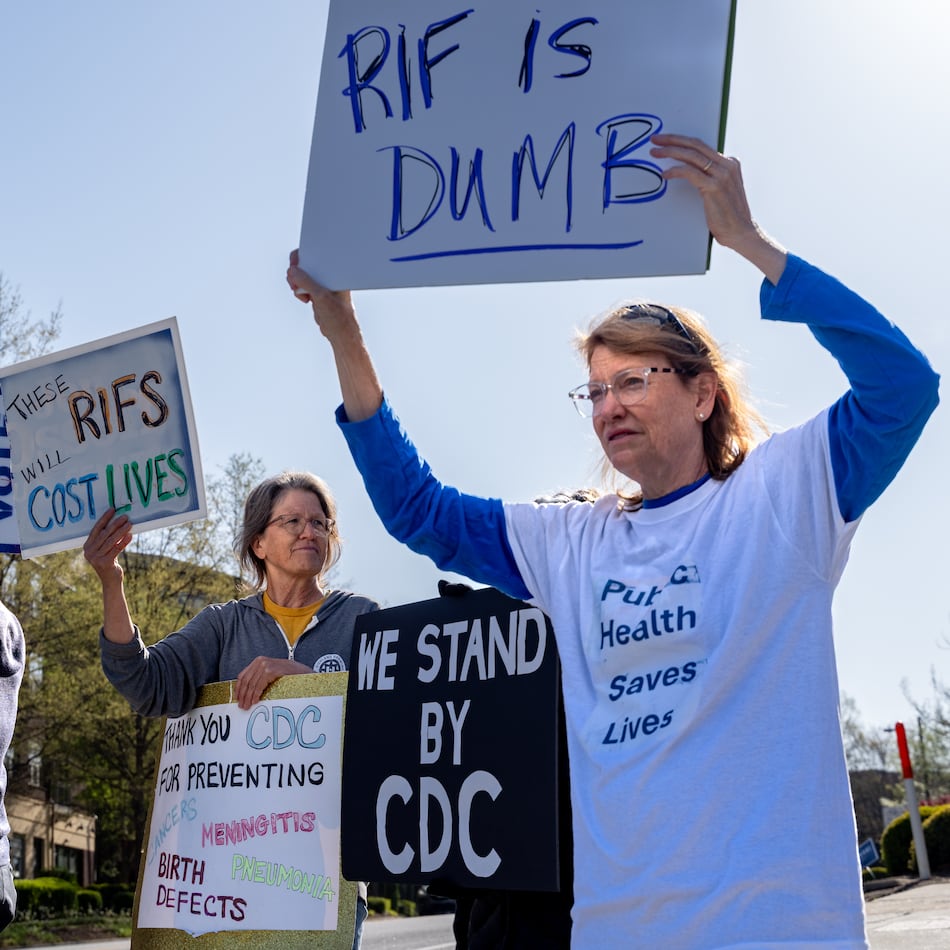NEW YORK (AP) — President Donald Trump's fast-approaching "Liberation Day" sent stock markets swinging sharply worldwide on Monday.
On Wall Street, the S&P 500 rose 0.6% in another roller-coaster day, after being down as much as 1.7% during the morning. The reversal helped the index shave its loss for the first three months of the year to 4.6%, making it the worst quarter in two-and-a-half years.
The Dow Jones Industrial Average also swerved higher after erasing an initial loss, and it climbed 417 points, or 1%. Slides for Tesla, Nvidia and other influential Big Tech stocks, though, sent the Nasdaq composite down 0.1%.
Such neck-twisting turns have become routine for the U.S. stock market recently because of uncertainty about what Trump will do with tariffs — and by how much they will worsen inflation and grind down growth for economies. Wall Street's swings followed a sell-off that spanned the world earlier Monday as worries built about the effects of the tariffs that Trump says will bring manufacturing jobs back to the United States.
In Japan, the Nikkei 225 index dropped 4%. South Korea’s Kospi sank 3%, and France’s CAC 40 fell 1.6%.
Instead of stocks, prices strengthened for things considered safer bets when the economy is looking shaky. Gold rose again to briefly crest $3,160 per ounce.
Prices for Treasury bonds also climbed, which in turn sent their yields down. The yield on the 10-year Treasury fell to 4.21% from 4.27% late Friday and from roughly 4.80% in January.
On Wednesday, the United States is set to begin what Trump calls " reciprocal " tariffs, which will be tailored to match what he sees is the burden each country places on his, including things like value-added taxes. Much is still unknown, including exactly what the U.S. government will do on "Liberation Day."
At Goldman Sachs, economists expect Trump to announce an average 15% reciprocal tariff. They also raised their forecast for inflation and lowered it for U.S. economic growth for the end of the year.
They now see a 35% chance of recession in the next year, up from an earlier forecast of 20%, “reflecting our lower growth forecast, falling confidence, and statements from White House officials indicating willingness to tolerate economic pain,” according to Goldman Sachs economist David Mericle.
If the April 2 tariffs end up being less onerous than investors fear — maybe Trump includes no additional tariff increases on China, for example — stocks could rally. But if they end up being a worst-case scenario, which gets businesses so fearful that they start cutting their workforces, stocks could sink much further.
Of course, there’s also the chance that April 2 does little to clear the uncertainty. It could end up being a “stepping stone for further negotiations” instead of a “clearing event” for the market, according to Michael Wilson and other strategists at Morgan Stanley.
“This means policy uncertainty and growth risks are likely to persist — it’s a question of to what degree,” Wilson wrote in a report.
One worry is that even if Trump's tariffs end up being less harsh than feared, all the uncertainty created by them alone could cause U.S. households and businesses to freeze their spending, which would hurt an economy that had been running at a solid pace to close last year.
Either way, some familiar names were among Wall Street’s hardest hit on Monday.
Tesla fell 1.7% to bring its loss for the year so far to 35.8%. It's been one of the year's worst performers in the S&P 500 in large part because of fears that the electric-vehicle maker's brand has become too intertwined with its CEO, Elon Musk.
Musk has been leading U.S. government efforts to cut spending, making him a target of growing political anger, and protests have swarmed Tesla showrooms as a result.
Other Big Tech stocks also struggled. They’ve been at the sell-off’s center in large part because of criticism that their stock prices had become too expensive. Critics pointed to how their prices rose faster than their already quick-growing profits in recent years.
Nvidia, which has ridden the frenzy around artificial-intelligence technology to become one of Wall Street's most influential stocks, fell 1.2% to bring its loss for the year so far to 19.3%.
On the winning side of Wall Street was Mr. Cooper, which jumped 14.5% after the home loan servicer said it's being bought by mortgage company Rocket in an all-stock deal valued at $9.4 billion. The deal comes just weeks after Rocket acquired real estate listing company Redfin, and Rocket's stock fell 7.4%.
Warren Buffett’s Berkshire Hathaway rose 1.2% and was one of the strongest forces lifting the S&P 500. The parent of GEICO and other companies said earlier this year it’s sitting on $334.2 billion in unused cash. Such a large amount could indicate Buffett, who’s famous for buying when prices are low, may see little worth purchasing in a stock market that critics had called too expensive.
Newsmax surged 735% in a dizzying first day of trading for the stock of the news company. Its price was so volatile that trading of its stock was briefly halted a dozen times through the day.
All told, the S&P 500 rose 30.91 points to 5,611.85. The Dow Jones Industrial Average climbed 417.86 to 42,001.76, and the Nasdaq composite fell 23.70 to 17,299.29.
___
AP Writers Junzhe Jiang and Matt Ott contributed.
Credit: AP
Credit: AP
Credit: AP
Credit: AP
Credit: AP
Credit: AP
Keep Reading
The Latest
Featured





